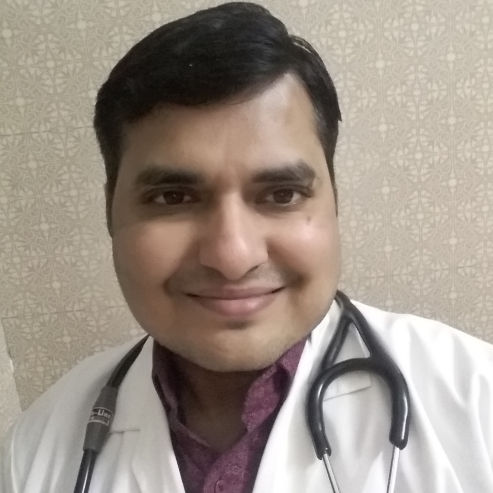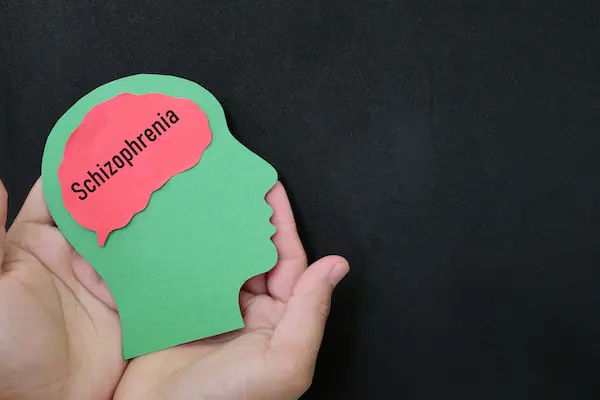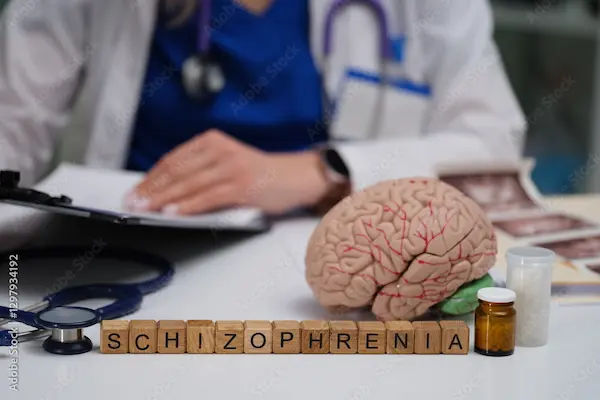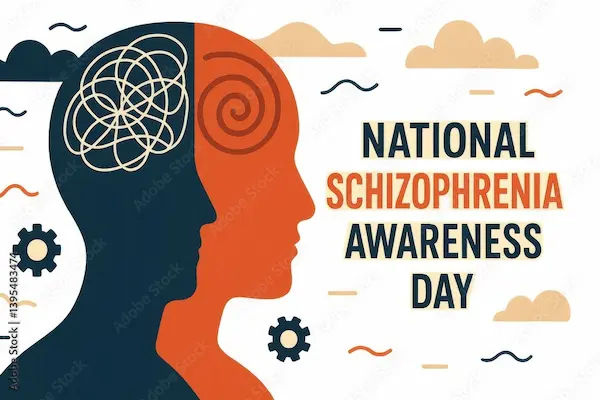What Leads To Signs Of Schizophrenia Treatment Prevention
Learn about schizophrenia prevention by understanding its causes, recognising early warning signs, and exploring effective treatment options for better mental health outcomes.

Written by Dr. Mohammed Kamran
Reviewed by Dr. J T Hema Pratima MBBS, Fellowship in Diabetes Mellitus
Last updated on 13th Jan, 2026

Schizophrenia is a complex and often misunderstood mental health condition that affects how a person thinks, feels, and behaves. Contrary to popular myth, it doesn't mean a "split personality," but rather a disruption in the integration of thoughts, emotions, and perceptions. For the general public seeking answers, understanding what leads to schizophrenia is the first crucial step toward recognizing its signs and exploring avenues for treatment and, where possible, prevention. This article will demystify the causes of schizophrenia, from genetics to life experiences. We will break down the early warning signs that are often missed, detail the most effective modern treatment options that combine therapy and medication, and discuss the realistic, evidence-based strategies that may help reduce the risk of its development or severity. Our goal is to provide a clear, compassionate, and actionable guide for anyone concerned about themselves or a loved one.
What is Schizophrenia?
Schizophrenia is a chronic brain disorder that affects less than 1% of the U.S. population. It is characterized by episodes of psychosis, where a person has difficulty distinguishing between what is real and what is not. These episodes involve a combination of hallucinations (seeing or hearing things that aren't there), delusions (fixed false beliefs), and extremely disordered thinking and behavior that impairs daily functioning. It's a serious condition, but with the right treatment and support, many people with schizophrenia can lead fulfilling and productive lives.
What Leads to Schizophrenia?
There is no single cause of schizophrenia. Research suggests it arises from a complex interplay of genetic, brain chemistry, and environmental factors.
Genetic Predisposition and Family History
Schizophrenia tends to run in families. Having a first-degree relative (parent or sibling) with schizophrenia increases one's risk. However, it's important to note that over 80% of people with schizophrenia have no family history of the disorder. Scientists believe it’s not one gene but a combination of different genes that make a person vulnerable.
Brain Chemistry and Structure Imbalances
Imbalances in neurotransmitters, particularly dopamine and glutamate, are strongly implicated in schizophrenia. Brain imaging studies also show subtle differences in the brain structure and central nervous system of some people with the condition, such as reduced gray matter.
Environmental Risk Factors
Genetics load the gun, but environment often pulls the trigger. Key factors include:
Pregnancy and Birth Complications: Exposure to viruses, toxins, or malnutrition in the womb, and oxygen deprivation during birth.
- Mind-Altering Drug Use: Using psychoactive or psychotropic drugs during teen years and young adulthood, especially cannabis, amphetamines, and LSD, can significantly increase risk in vulnerable individuals.
- Childhood Trauma and Extreme Stress: Highly stressful experiences or environments during childhood are a significant contributing factor.
Early and Later Symptoms
Early intervention is critical for a better long-term outcome. Signs usually first appear in the late teens to early 30s, and earlier in males than females.
Early Warning Signs (The Prodromal Phase)
Before a full-blown psychotic episode, there are often subtle changes that may last for weeks or even years. These early symptoms of schizophrenia can include:
- Social withdrawal and isolation
- A drop in grades or job performance
- Neglect of personal hygiene
- Deterioration of relationships
- Unusual speech or patterns of thought
- Apathy or lack of motivation (avolition)
Consult Top Specialists
Positive, Negative, and Cognitive Symptoms
Schizophrenia symptoms are often categorized into three types:
- Positive Symptoms: "Additions" to reality (e.g., hallucinations, delusions, disorganized speech, agitated body movements).
- Negative Symptoms: "Subtractions" from normal behavior (e.g., reduced expression of emotions, reduced speaking, inability to experience pleasure - anhedonia, lack of motivation).
- Cognitive Symptoms: Problems with thought processes (e.g., poor executive functioning, trouble focusing, memory issues).
Modern Schizophrenia Treatment
Treatment for schizophrenia is lifelong and often involves a combination of therapies, even after symptoms have eased.
Antipsychotic Medications
These are the cornerstone of treatment, designed to control symptoms by affecting brain neurotransmitters. The goal is to manage signs and symptoms at the lowest possible dose. Atypical antipsychotics (second-generation) are usually preferred as they have fewer severe side effects than first-generation typical antipsychotics.
Psychosocial Interventions and Therapy
Medication alone is not enough. Key therapies include:
- Individual Therapy: Cognitive behavioral therapy (CBT) can help manage symptoms and challenge distorted thinking.
- Social Skills Training: Focuses on improving communication and social interactions.
- Family Therapy: Provides support and education for families to help them cope and create a better support environment.
- Vocational Rehabilitation and Supported Employment: Helps people with schizophrenia prepare for, find, and keep jobs.
Coordinated Specialty Care (CSC)
This is a recovery-oriented treatment model for first-episode psychosis. It integrates medication, psychotherapy, case management, family involvement, and supported education/employment, all from a team of specialists.
Can Schizophrenia Be Prevented?
Since the exact cause is unknown, there is no surefire way to prevent schizophrenia. However, a schizophrenia prevention strategy focuses on mitigating risk and strengthening resilience, especially in those known to be at higher risk.
Strategies for High-Risk Individuals
For young people with a strong family history or who show potential prodromal signs, these steps may help:
- Avoiding Drug Use: Particularly avoiding cannabis and other psychoactive drugs is one of the most actionable pieces of schizophrenia prevention advice.
- Stress Management: Learning healthy coping mechanisms for stress through mindfulness, exercise, and therapy.
- Building a Strong Support System: Fostering strong connections with family, friends, and community.
- Early Intervention: Seeking help at the very first signs of trouble is a form of secondary prevention. If you notice persistent changes in thoughts or behavior in a loved one, consulting a doctor online with Apollo24|7 for a preliminary evaluation can be a discreet and helpful first step.
Living with and Managing Schizophrenia
A diagnosis is not the end. Effective management involves:
- Sticking to the Treatment Plan: This is the most critical factor in preventing relapse.
- Avoiding Alcohol and Drugs: These can worsen symptoms and interfere with medications.
- Learning to Recognize Relapse Warning Signs: Such as insomnia, social withdrawal, or increased suspiciousness.
- Joining a Support Group: Connecting with others facing similar challenges reduces stigma and isolation.
Conclusion
Understanding the pathways that lead to schizophrenia empowers us to demystify the condition and replace fear with knowledge. While the interplay of genetic vulnerability and environmental triggers is complex, recognizing the early signs can dramatically alter the course of the illness through prompt intervention. Modern treatment is a multifaceted journey of medication, therapy, and strong support systems, offering real hope for management and recovery. Although absolute prevention may not yet be possible, proactive strategies like avoiding substance use and prioritizing mental wellness are powerful tools for mitigating risk. If you suspect that you or someone you care about is showing potential signs, the most important step is to seek professional guidance without delay. Taking that first step towards evaluation is an act of courage and the foundation for building a healthier future.
Consult Top Specialists
Consult Top Specialists

Dr. Kommoju Venkata Eswar
Psychiatrist
8 Years • MBBS, MD Psychiatry
Avenue
Wellness Point, Avenue

Dr. Vivek Pathak
Psychiatrist
15 Years • MBBS, MD (Psychiatry)
Noida
𝗗𝗿 𝗞𝗨𝗠𝗔𝗥'𝗦 𝗙𝗔𝗠𝗜𝗟𝗬 𝗖𝗟𝗜𝗡𝗜𝗖 𝗮𝗻𝗱 𝗩𝗔𝗖𝗖𝗜𝗡𝗔𝗧𝗜𝗢𝗡, Noida
(25+ Patients)

Dr Rohit Ranjan
Psychiatrist
10 Years • MBBS, MD (Psychiatry)
Bengaluru
Apollo Medical Center, Marathahalli, Bengaluru
(25+ Patients)

Dr. Kamal Kishore Verma
Psychiatrist
15 Years • MBBS, MD (SPM), DNB (Psychiatry)
Mathura
PEACEFUL MIND CLINIC, Mathura
(50+ Patients)

Dr Harish K S
Psychiatrist
6 Years • MBBS, MD Pychaitrist
Bengaluru
Apollo Clinic, JP nagar, Bengaluru
Consult Top Specialists

Dr. Kommoju Venkata Eswar
Psychiatrist
8 Years • MBBS, MD Psychiatry
Avenue
Wellness Point, Avenue

Dr. Vivek Pathak
Psychiatrist
15 Years • MBBS, MD (Psychiatry)
Noida
𝗗𝗿 𝗞𝗨𝗠𝗔𝗥'𝗦 𝗙𝗔𝗠𝗜𝗟𝗬 𝗖𝗟𝗜𝗡𝗜𝗖 𝗮𝗻𝗱 𝗩𝗔𝗖𝗖𝗜𝗡𝗔𝗧𝗜𝗢𝗡, Noida
(25+ Patients)

Dr Rohit Ranjan
Psychiatrist
10 Years • MBBS, MD (Psychiatry)
Bengaluru
Apollo Medical Center, Marathahalli, Bengaluru
(25+ Patients)

Dr. Kamal Kishore Verma
Psychiatrist
15 Years • MBBS, MD (SPM), DNB (Psychiatry)
Mathura
PEACEFUL MIND CLINIC, Mathura
(50+ Patients)

Dr Harish K S
Psychiatrist
6 Years • MBBS, MD Pychaitrist
Bengaluru
Apollo Clinic, JP nagar, Bengaluru
More articles from Schizophrenia
Frequently Asked Questions
1. What are the very first signs of schizophrenia in a teenager?
Early signs can be subtle and mimic typical teen behavior. Key red flags include a sharp decline in academic performance, intense social isolation (withdrawing from all friends and family), bizarre or illogical thoughts, paranoia about others, and a complete neglect of personal hygiene and appearance.
2. Can someone with schizophrenia live a normal life?
Yes, many people with schizophrenia can live highly functional and satisfying lives. This depends on consistent adherence to their treatment plan, which includes medication, therapy, and a strong support network. Recovery is often about management and building a meaningful life despite the diagnosis.
3. Is schizophrenia inherited from the mother or father?
Schizophrenia is not inherited from one parent in a simple way. It's a polygenic disorder, meaning multiple genes from both parents contribute to an increased risk. Having a family history is a risk factor, but it is not a deterministic guarantee that a child will develop the condition.
4. What is the main drug used to treat schizophrenia?
There is no single 'main' drug. Second-generation (atypical) antipsychotics are typically first-line treatments. These include medications like risperidone, olanzapine, quetiapine, and aripiprazole. The choice of medication is highly individualized based on symptoms and side effects.
5. Can vitamin deficiency cause schizophrenia?
While a vitamin deficiency does not directly cause schizophrenia, there is emerging research linking certain deficiencies (like Vitamin D, B vitamins, and omega-3 fatty acids) to worsened brain health and a potentially increased vulnerability to psychiatric disorders, including psychosis. A balanced diet is an important part of overall mental wellness.


